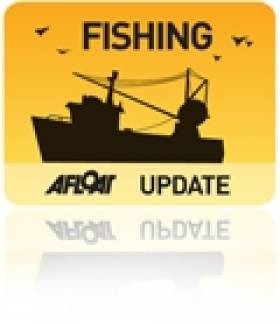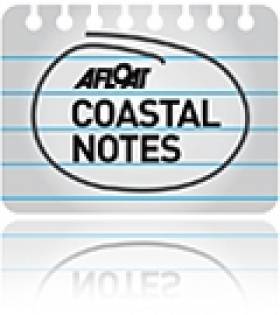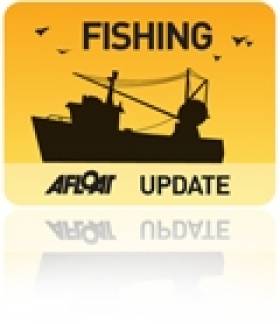Displaying items by tag: Marine Harvest
Fish Farm Firm Suspends Harvest Till Weather Improves
#FishFarms - Fish farming has been suspended by one of Ireland's largest salmon aquaculture firms due to the current poor weather and effects of warming waters, according to The Irish Times.
In its latest quarterly report, Marine Harvest cited "very challenging" conditions in Irish waters thanks to last summer's high sea temperatures, which in turn have resulted in a big rise in jellyfish numbers.
And the situation has been exacerbated by "the most consistently stormy period since Marine Harvest Ireland began farming in Ireland in 1979" that have also wreaked havoc for coastal shellfish farms.
The conditioons have preventing access to coastal fish farming sites, according to the firm's technical manager Catherine McManus, who said operations are expected to resume later this month.
The Irish Times has more on the story HERE.
Meeting for Bantry Bay Fish Farm Opponents Tonight
#COASTAL NOTES - Bantry Bay has reached its capacity for salmon farming, says the committee formed to oppose a proposed new facility at Shot Head.
Save Bantry Bay has called a public meeting for supporters tonight (24 March) at Eccles Hotel in Glengarrif, Co Cork, starting at 8.15pm - where chairman Kieran O'Shea will give a presentation on the group's "wide-ranging objections", as The Fish Site reports.
Minister for the Marine Simon Coveney is currently considering the licence application for Marine Harvet's proposed salmon farm at Shot Head in Adrigole.
Concerns among the committee's members include the potential spoiling of the area's natural beauty having a knock-on effect on tourism, and the environmental consequences of algae blooms from nitrogen and phosphorous waste.
Local fisherman fear that a fish farm of more than 100 acres would see the closing off of part of an "important ground for shrimp and prawn".
Possible infection of wild salmon in local river systems by sea lice from farmed salmon is also an issue, with the Environmental Impact Statement for Shot Head highlighting an outbreak of lice at Marine Harvest's facility in Roancarrig two years ago.
The Fish Site has more on the story HERE.
- Coastal Notes
- Fishing
- Bantry Bay
- Co Cork
- fish farm
- salmon farm
- Shot Head
- Adrigole
- Glengarrif
- Eccles Hotel
- Save Bantry Bay
- Minister for the Marine
- Simon Coveney
- Marine Harvest
- tourism
- environment
- algae blooms
- nitrogen
- phosphorous
- waste
- shrimp
- prawn
- infection
- Wild Salmon
- sea lice
- environmental impact statement
- Roancarrigh
Ministers Meet World's Biggest Seafood Company
The Minister for Agriculture, Fisheries and Food, Brendan Smith TD and Minister of State, Sean Connick TD, met yesterday with the CEO of Marine Harvest, one of the world's biggest seafood companies, which has extensive investment in the aquaculture industry right along the western seaboard of Ireland, to discuss the potential for significant expansion of the industry in Ireland.
Mr. Alf-Helge Aarskog CEO of the Norwegian based multi - national company and Mr Jan Feenstra CEO of its Irish operations, outlined to the Ministers the challenges, opportunities and potential for finfish production globally. The company's Irish fish farms, in Donegal, Mayo, Cork and Kerry, have been expanding production and hope to produce between 10 and 12,000 tonnes of salmon for export from Ireland this year. The company has been increasingly moving to the production of premium organic salmon and this year expect that 70% of their Irish production will be sold in prime European markets as organically produced fish.
The company, which currently employs 250 people in Ireland and 5,000 worldwide sees significant potential to double production and employment in Ireland over the next ten years. To achieve this the company sought to explore with Ministers how aquaculture activity can be best expanded and developed sustainably in existing and new offshore locations on the Irish coastline.
Both Ministers emphasised the synergies between the company's production plans and the broad strategic vision set out in the Government's 'Food Harvest 2020' report. The focus by Marine Harvest Ireland on the sustainable production of salmon for export , mainly through organic methods has very significant benefits for job protection and creation in communities around the coast.
Minister Smith said "Exports are fundamental to Ireland's economic recovery and role that Marine Harvest and other aquaculture operators can play in further expanding exports of seafood is hugely important." Minister Smith added that "Our seafood exports increased by 18% in value last year and our Government's Food Harvest 2020 strategy outlines the enormous export potential in this sector in coming years" .
Minister Sean Connick said that "I have over the last year focussed heavily on the Aquaculture sector as a driver of substantial permanent and sustainable employment in our coastal communities. I can see enormous potential for the expansion of both finfish & shellfish aquaculture. To this end, the expertise of my Department and it's Agencies is fully focussed on the sustainable development of the industry in line with the overall Government Strategy."
IEA Export Industry Awards to Shipping
In the category of Short Sea Shipping Company of the Year, sponsored by the Irish Maritime Development Office, which recognises the strategically important role of short sea shipping to our economy, the winner of the award was CLDN Colbefret Group.
The Belgium operator opened two new routes from Dublin to Rotterdam and Zeebrugge in November last year, providing a range of transport options to Irish exporters selling to Europe. Since then Cobelfret have gradually introduced new Con-Ro (Containers and Roll-On/Roll-Off) vessels onto the continental routes. The six 25,000 gross tonnes newbuilds were built by FGS Flensburg, Germany and the latest unit Opaline, is due to make a Dublin debut tomorrow.
Cobelfret's operations in Dublin are based in Alexandra Basin East using the ports No. 2 ro-ro linkspan berth. A previous linkspan built in the 1950's was demolished last summer to develop a larger linkspan, to cater for larger tonnage like the Opaline. The new vessel has 2,907 lane metres for freight vehicles spread over three decks and a container capacity for 854 TEU mafi-trailers.
Donegal based Marine Harvest won the Seafood Export Award, sponsored by Bord Biá. The company is an indigenous fully-integrated salmon breeding, farming and processing operation, exporting premium products to Europe and North America.
The overall winner of the IEA's Export Industry Award for 2010 was the Irish Dairy Board.
































































